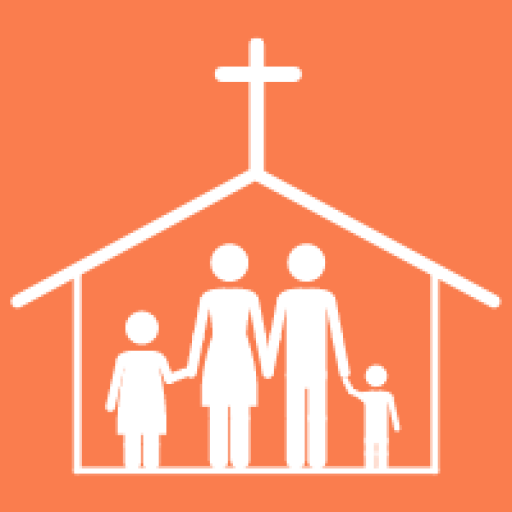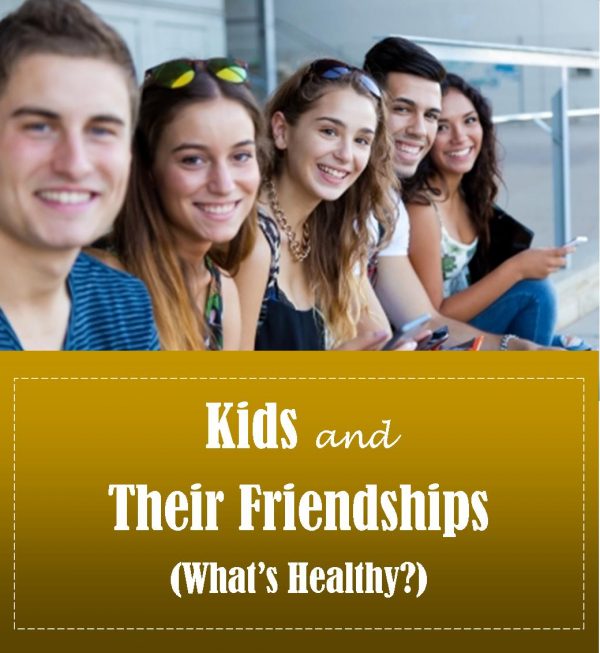What makes a child’s friendships healthy or unhealthy?
My oldest son had two close friends throughout his childhood. He met them when he was five, and they are still friends today fifteen years later. My other children have had friends come and go because of moves, inter-personal differences, or just the ol’ drifting away thing. I’ve had time to really pay attention to these friendships and to recognize the signs that a particular friendship wasn’t healthy for my child.
Children show a normal developmental sequence in their friendships. You can read here about what to expect in your child’s friendships as she grows up. My reflection here applies to kids who are over 8.
I want my kids to have friends. I know it’s important for their well-being. Our yearning for friendship is natural because we are not meant to be alone; we can never be whole without communion and love. Our friendships remind us of how God feels about us and how he wants us to feel about him. He doesn’t want us to fear him, to avoid him; he wants us to hang out with him and let our guard down. He’s the kind of friend who laughs at your bad jokes because he hears the joke the way you meant it, not the way it comes out!
God even uses our friends to reveal to us things we wouldn’t otherwise notice about others, the world, ourselves, and God himself. Friendships are little sacraments, a sign of God’s special graces and the instrument of some of his best surprises for us. I can use my children’s affection for their human friends to teach them these deeper truths about The Great Friend.
On the other hand, Satan can use our relationships to ensnare us; they can become an instrument of darkness. Wise parents have an awareness of two things when it comes to their kids’ friends: 1) the health of the dynamics between the child and her friends and 2) the balance in their homes between family and outside friends.
1. What makes for healthy or unhealthy friendships?
In healthy friendships, our child is able to be himself, and he’s able to grow and change as he matures. In unhealthy friendships, our child is fearful of being himself, and the friend feels threatened by our child’s new interests or developing abilities.
In healthy friendships, our child is free to have other friends. In unhealthy friendships, our child doesn’t nourish new friendships because her current friend becomes jealous.
In healthy friendships, our child is free to form her own opinions. In unhealthy friendships, one friend sets the standards for acceptable opinions and the other friend feels compelled to agree with those opinions for fear of rejection.
In healthy friendships, our child feels nourished and enlivened by the relationship. In unhealthy friendships, our child feels drained and exhausted after being with the friend.
In healthy friendships, friends can trust each other and count on one another. In unhealthy friendships, one of the friends may betray confidential conversations, frequently let the other friend down, or lie and manipulate.
Most important, in healthy friendships, our child’s values and Catholic faith is strengthened rather than deflated. I’ve learned the hard way that as my kids enter the pre-teen years, I need to be very careful about the values their friends have. I’m more discerning now about where I bring my kids. I do want their friendships to unfold naturally; I don’t want to pick their friends for them. But I make it easy for them to connect with kids with good values and morals.
My oldest met a few good friends in our parish’s youth group, but my younger children haven’t made any close friends there. No requests to hang out beyond our parish’s doors. At least not yet. Last year, we joined American Heritage Girls and Trail Life, Christian scouting organizations. The AHG Troop for girls and the TL troop for boys even meet on the same night in the same building, so all my children go to the same place for their scouting meetings. Oh my. What an incredible blessing! My children have made many wonderful Christian friends through their troops. Perfect? No. But pretty terrific.
2. Find Your BFF (Balanced Family First)
Kids need space and time to think, to grow, to settle back into themselves after being with others, particularly their peers. You can get the impression from watching t.v. or reading magazines that it’s normal for kids to spend nearly every waking hour with their friends, and to message them every minute they’re not physically with them. Perhaps this is the norm, but it’s not healthy.
If children really can’t tolerate being alone, if they become uncomfortable without peers around, there is a problem with that child’s self-perception, emotional adjustment, or relationship with her parents. Some teenagers rely on their peers for their sense of identity and their deepest held values, and this is unhealthy. Emotionally healthy children enjoy and cherish their friendships, but they still trust their parents more than anyone else. Their parents are their “secure base,” and their parents’ values are their values. They hang out with friends, but they have a natural tendency to return to their parents’ company in order to “check in” emotionally.
I am responsible for helping my kids nourish their friendships; I’m also responsible for helping them build habits that allow for a good balance between friend time and alone time. My two middle children would have friends over all day, every day if I consented. They are extroverted, but the rest of the family tend to be introverted. The middle children have a legitimate need for friendship, but the rest of us also have a legitimate need for some quiet hours. I have to balance those needs. And there is a difference between a legitimate need and a mere desire. I want to facilitate my children’s friendships because this is a real need, but I can meet that need without consenting to all desires to see those friends.
So, when the two middle kids ask to have friends over, I simply have to say no sometimes, not only for my sake but for theirs and the rest of the family. They will not break open and dissolve into a vapor. And what are their friends doing when they aren’t at my house? They are usually spending time with their families, visiting relatives, doing chores, practicing their musical instruments, or working on history projects. In short, their friends have many opportunities and gifts apart from my children, and my children, the wonderful friends that they are, really want that for their friends.
Resources
Videos:
Who Do You Spend Time With? by Fr. Mike Schmitz. For Catholic teens and adults. You become like the 5 people you spend the most time with. We can have misplaced loyalty to people we know are bad for us.
Books:
The Canons of Friendship by Alice von Hildebrand. A beautiful essay on the spiritual significance of friendship.
We Saved You a Seat: Finding and Keeping Lasting Friendships by Lisa Jo Baker. For teen girls. Protestant.
The Christian Girls Guide to Friendship by Kathy Widenhouse. For tween girls. Protestant.
Growing Friendships by Eileen Kennedy-Moore. Secular. A book for younger kids about how to be a good friend. This would be a great read aloud.

